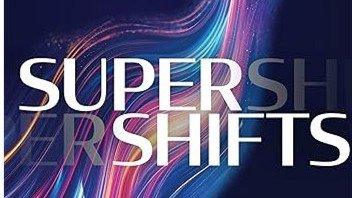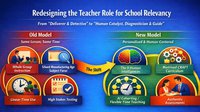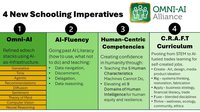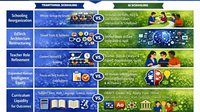Artificial Intelligence is no longer an emerging tool. It’s a transformative force reshaping how, why, and where we learn. As we move deeper into the Age of Intelligence, education is evolving from a rigid, standardized system into a living, adaptive ecosystem designed to unlock human potential at every stage of life. The question is no longer if education will change. The real question is: how will we shape that change to serve a more equitable, empowered, and human-centered future?
We are at a crossroads. Education systems built in the industrial age are now colliding with technologies of the exponential age. While AI is driving much of this change, the true transformation is not about the machines. It’s about what this technology enables for human learning, development, and possibilities.
1. Learning Becomes Truly Individualized
The days of a one-size-fits-all curriculum is rapidly fading. AI enables a shift toward deeply personalized and even hyper-personalized learning experiences that evolve in real-time. Imagine a seventh-grade student struggling with fractions. Instead of waiting for a parent-teacher conference or the following standardized test, an AI-powered tutor instantly recognizes the learning gap, adapts the lesson, and offers practice problems tailored to that student’s cognitive profile. Now scale that capability across an entire classroom or across continents.
This is the promise of AI-driven personalization. And it doesn’t stop at primary or secondary school. Whether it’s a veteran reskilling in cybersecurity or a retail worker transitioning into healthcare, AI can act as a personal learning concierge, suggesting courses, adapting pacing, and simulating real-world scenarios based on both learner goals and market demands. This level of personalization, once reserved for private tutoring or elite institutions, is becoming increasingly accessible. As the cost of AI-driven platforms drops, we have the potential to democratize access to quality learning at scale.
2. Educators Evolve into Guides and Designers
One of the biggest misconceptions about AI in education is that it will replace teachers. In reality, it’s poised to do the opposite: elevate them. By automating administrative tasks such as grading, attendance tracking, and even lesson planning, AI frees educators to focus on what truly matters: mentoring, facilitating, and nurturing human potential. Future educators will resemble learning experience designers more than lecturers. They’ll curate project-based learning modules, oversee AI-assisted group discussions, and guide students through immersive simulations. Their primary role? To foster creativity, ethical reasoning, emotional intelligence, and curiosity- skills that machines cannot replicate.
Picture a classroom where a teacher facilitates a collaborative design challenge: students collaborate to develop sustainable city models in an AI-enhanced virtual world. The AI handles the logistics and data tracking, while the teacher coaches the students through systems thinking and teamwork dynamics. This is not a distant future—it’s already beginning in experimental schools around the world. It’s redefining the role of the educator as a human connector in a tech-augmented ecosystem.
3. Teaching the Skills Machines Can’t Replace
As automation takes over repetitive tasks, the value of distinctly human capabilities skyrockets. Emotional intelligence. Critical thinking. Cross-cultural collaboration. Ethical judgment. Creativity. These are not “soft skills” but survival skills in an AI-integrated world.
Future-ready education won’t just prepare students to use AI; it will teach them how to work with it, question it, and even teach it. Students will engage in co-creative processes with intelligent systems—collaborating with AI to compose music, write code, or test theories. One of the most powerful shifts will be helping students develop a healthy, critical relationship with technology. Knowing how to train an algorithm, detect bias, or understand the ethical implications of data usage will be as fundamental as learning math or reading comprehension. In essence, we’ll be preparing learners to not only participate in but also shape the future workforce.
4. Unlocking Equity at Scale
AI presents a transformative opportunity to tackle some of the most persistent educational inequities. However, it also poses significant risks if we do not approach its design with intention. When implemented correctly, AI can help identify students at risk of falling behind before human educators even detect the signs. It can translate lessons across languages, read to students with visual impairments, and tailor interfaces for neurodivergent learners. Additionally, it can act as a bridge in areas where teacher shortages or underfunded schools have created learning deserts.
However, the promise of equity will only be realized if we are vigilant about inclusivity. Biases in training data must be addressed. Infrastructure gaps—like internet access and device availability—must be closed. And ethical frameworks must guide system design from the very beginning. Equity is not just a feature of future education—it must be a foundational design principle.
5. Rethinking What—and How—We Teach
If we agree that the world is changing, then what we teach must change too. It’s no longer enough to prepare students for a fixed career path. We must prepare them for a world of continuous transformation. The curriculum will need to embrace new literacies: AI fluency, data ethics, systems thinking, environmental stewardship, and future foresight. Students won’t just learn about the French Revolution, they’ll step into virtual reconstructions of it, debate policy decisions in real time, and analyze their ripple effects across centuries.
Education will increasingly become interdisciplinary and experiential. Think immersive challenges, virtual labs, real-time simulations, and augmented reality storytelling. The shift isn’t just about content, it’s about context. Learning will feel less like preparing for a test and more like preparing to lead a project, solve a global issue, or launch an initiative that matters. It will also help children who are neurodivergent find new pathways to explore topics that might have shied away from previously.
6. Education Without End
In the past, education had an expiration date. You attended school, perhaps college, and then entered the workforce. In the Age of Intelligence, that model is obsolete. As industries evolve in months rather than decades, continuous learning isn’t a luxury—it’s a necessity. AI will facilitate dynamic, lifelong learning journeys. It will recommend just-in-time courses, micro-credentials, and on-the-job simulations tailored to your career evolution, personal interests, and emerging trends.
You might be learning from your smart assistant during your commute or from a neural implant providing you with data insights while you work. Education becomes a continuous stream, integrated into life, not separated from it. Perhaps most importantly, it becomes increasingly learner-led. Individuals will determine not just what to learn, but why, guided by their values, curiosity, and purpose.
Shaping the Future of Learning—Together
The future of education isn’t just about digitizing the classroom or sprinkling in some AI chatbots. It’s about reimagining the entire learning ecosystem, who it serves, how it evolves, and what kind of future it enables.
So, we must ask:
● How do we design learning systems that empower, not overwhelm?
● How do we protect human agency in an increasingly automated landscape?
● Are we teaching students how to solve yesterday’s problems or tomorrow’s?
If we choose wisely, AI won’t just improve education. It will deepen it. Expand it. Make it more human, not less. Because at its best, education isn’t about passing tests—it’s about expanding what it means to be human in a world full of intelligent tools, complex challenges, and unlimited potential.
About the authors
Dr. Ja-Naé Duane and Steve Fisher are co-authors of the new book SuperShifts: Transforming How We Live, Learn, and Work in the Age of Intelligence. Dr. Duane is a leading behavioral scientist, Brown Faculty, & MIT Research Fellow. Steve Fisher is a renowned futurist, entrepreneur, and host of the podcast Think Forward.











